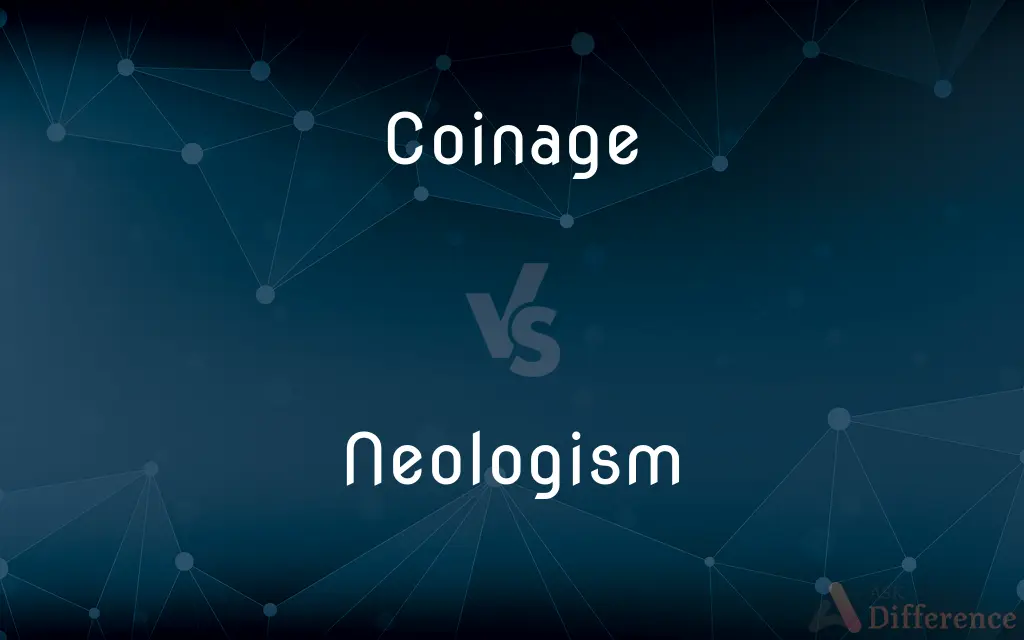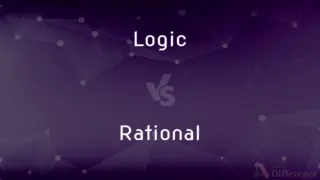Coinage vs. Neologism — What's the Difference?
By Urooj Arif & Maham Liaqat — Updated on March 26, 2024
Coinage refers to the creation or invention of new words or phrases, often by individuals or specific groups, while neologism is newly coined word, expression, or usage within a language, reflecting evolving social, technological, and cultural landscapes.

Difference Between Coinage and Neologism
Table of Contents
ADVERTISEMENT
Key Differences
Coinage involves the process of inventing or introducing new words or expressions into a language. This creative endeavor can be undertaken by authors, scientists, marketers, or anyone looking to fill a linguistic gap or express an idea in a novel way. On the other hand, neologism describes the outcome of such coinages - the new words or expressions themselves, once they have been created and begin to gain acceptance within a language community.
While coinage is an act that results in the creation of neologisms, not all neologisms achieve widespread acceptance or long-term usage in a language. Neologisms are often born out of the need to describe new technologies, concepts, cultural phenomena, or to offer new perspectives on existing ideas. Meanwhile, coinage as a process can be deliberate or accidental, with creators sometimes unaware of the potential impact or longevity of their linguistic inventions.
The life cycle of a neologism can vary greatly; some neologisms quickly become integrated into everyday language, reflecting their relevance and the community's acceptance of them. In contrast, coinage does not guarantee that a word will transition into common usage, as this depends on factors such as utility, popularity, and the ability of the word to fill a linguistic or conceptual void.
Neologisms, once coined and adopted, can significantly influence the evolution of a language, marking shifts in culture, technology, and societal norms. Coinage, therefore, plays a critical role in the linguistic adaptation process, providing the means through which language can evolve to accommodate new ideas and innovations.
The distinction between coinage and neologism lies in the former being a process and the latter being the product of that process. While anyone can engage in coinage, the adoption and endurance of a neologism depend on its relevance, utility, and acceptance by the language community. This dynamic reflects the organic, ever-changing nature of language and its intrinsic connection to human experience and societal development.
ADVERTISEMENT
Comparison Chart
Definition
The act of creating or inventing new words or expressions.
A newly coined word, expression, or usage.
Origin
Can be traced to individuals or specific groups.
Results from the process of coinage.
Acceptance
Does not guarantee widespread use or longevity.
Depends on adoption by language community.
Purpose
To fill a linguistic gap or express new ideas.
Reflects new technologies, concepts, or cultural phenomena.
Process/Product
Process of invention.
Product of the coinage process.
Compare with Definitions
Coinage
The invention of terms for new concepts.
The term blog was a coinage reflecting the rise of online journals.
Neologism
A newly created word or expression.
Googling became a neologism for searching online using the Google search engine.
Coinage
Acts of naming newly discovered phenomena.
Quark was a coinage in the field of particle physics.
Neologism
Words that fill gaps in existing language.
Telework is a neologism that describes working from a distance using technology.
Coinage
A linguistic innovation introducing new expressions.
Cyberspace was a coinage that captured the essence of internet navigation.
Neologism
A term that reflects current cultural trends.
Ghosting is a neologism for ending a relationship by suddenly cutting off all contact.
Coinage
The process by which neologisms are introduced.
The coinage of selfie was spurred by advancements in smartphone technology.
Neologism
An expression that enters language from technological advances.
Cryptocurrency is a neologism describing digital currency systems.
Coinage
The creation of a new word or phrase.
Shakespeare's coinage of words like eyeball expanded the English language.
Neologism
New usages that emerge from social changes.
They as a singular pronoun is a neologism supporting gender inclusivity.
Coinage
The right or process of making coins.
Neologism
A neologism (; from Greek νέο- néo-, "new" and λόγος lógos, "speech, utterance") is a relatively recent or isolated term, word, or phrase that may be in the process of entering common use, but that has not yet been fully accepted into mainstream language. Neologisms are often driven by changes in culture and technology.
Coinage
Metal currency.
Neologism
A new word, expression, or usage.
Coinage
A system of metal currency.
Neologism
The creation or use of new words or senses.
Coinage
A new word or phrase.
Neologism
The invention of new words regarded as a symptom of certain psychotic disorders, such as schizophrenia.
Coinage
The invention of new words.
Neologism
A word so invented.
Coinage
Ancestry or social background
"Count Gengler was of common coinage, but in coming to America he took on a royal name" (Jimmy Breslin).
Neologism
(Theology) A new doctrine or a new interpretation of scripture.
Coinage
The process of coining money.
Neologism
A word or phrase which has recently been coined; a new word or phrase, or an existing one which has gained a new meaning.
Coinage
(uncountable) Coins taken collectively; currency.
Neologism
The act or instance of coining, or uttering a new word.
Coinage
The creation of new words, neologizing.
Neologism
(psychiatry) The newly coined, meaningless words or phrases of someone with a psychosis, usually schizophrenia.
Coinage
Something which has been made or invented, especially a coined word; a neologism.
Neologism
The introduction of new doctrine, for example in theology.
Coinage
The process of creating something new.
Neologism
The introduction of new words, or the use of old words in a new sense.
Coinage
The act or process of converting metal into money.
The care of the coinage was committed to the inferior magistrates.
Neologism
A new word, phrase, or expression.
Coinage
Coins; the aggregate coin of a time or place.
Neologism
A new doctrine; specifically, rationalism.
Coinage
The cost or expense of coining money.
Neologism
A newly invented word or phrase
Coinage
The act or process of fabricating or inventing; formation; fabrication; that which is fabricated or forged.
This is the very coinage of your brain.
Neologism
The act of inventing a word or phrase
Coinage
Coins collectively
Coinage
A newly invented word or phrase
Coinage
The act of inventing a word or phrase
Common Curiosities
What is the difference between coinage and neologism?
Coinage is the act of creating new words or phrases, while neologism refers to the newly coined words or expressions themselves.
Why are neologisms important?
Neologisms are important because they reflect societal changes, technological advancements, and cultural trends, helping language evolve.
How do neologisms become part of a language?
Neologisms become part of a language through widespread use, relevance, and acceptance by the language community.
Do all neologisms survive in the long term?
Not all neologisms survive in the long term; their endurance depends on continued relevance and usage.
How do linguists track the emergence of neologisms?
Linguists track neologisms by monitoring their usage in various media, literature, and public discourse, analyzing their adoption and evolution.
Can anyone create a neologism?
Yes, anyone can engage in coinage to create neologisms, but widespread acceptance depends on the language community.
Are neologisms always accepted by formal institutions?
Neologisms may not initially be accepted by formal institutions but can gain recognition over time as their usage becomes widespread.
What role does technology play in coinage?
Technology plays a significant role in coinage, often driving the need for new terms to describe emerging innovations and experiences.
Can neologisms change meaning over time?
Yes, like all aspects of language, neologisms can evolve and their meanings can change as they are used in new contexts.
How can a coinage gain popularity?
A coinage gains popularity through utility, exposure, and the ability to effectively communicate new concepts or phenomena.
Share Your Discovery

Previous Comparison
Funnelling vs. Funneling
Next Comparison
Logic vs. RationalAuthor Spotlight
Written by
Urooj ArifUrooj is a skilled content writer at Ask Difference, known for her exceptional ability to simplify complex topics into engaging and informative content. With a passion for research and a flair for clear, concise writing, she consistently delivers articles that resonate with our diverse audience.
Co-written by
Maham Liaqat













































